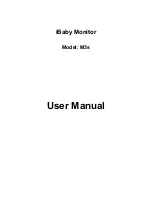
SBM-01 high precision battery monitor
5
The SBM-01 also makes an estimation of the time the battery can
support the present load (time-to-go readout). This is actually the time
left till the battery needs to be charged again. If the battery load is
fluctuating heavily it’s best not to rely on this reading too much since it is
a momentary readout and must be used as a guide only. We always
encourage the use of the state-of-charge readout for accurate battery
monitoring.
Besides the main function of the SBM-01, displaying the actual battery
status, this monitor offers a lot of other features too. The readout of
actual battery voltage, current and temperature (with optional
temperature sensor), the ability to store history data, the PC
computerlink and the Super-lock function are just a few features of the
SBM-01. These features are more specifically explained in the
corresponding chapters of this manual.
2. SETTING UP THE SBM-01
Before proceeding with this chapter, please make sure your SBM-01
is completely installed in accordance with the enclosed installation
guide.
When your SBM-01 is installed it is time to adjust the battery monitor to
your battery system. But before discussing the functions in the setup
menu, four important items are explained first in the next chapters. It is
important that users of the SBM-01 are having some insight in these four
items to become more familiar with battery monitoring. The actual setup
menu functions are explained in chapter 2.5 ‘Function overview’.
2.1 Charge Efficiency Factor (CEF)
Not all energy transferred into the battery during battery charging, is also
available during discharging of the battery. The charge efficiency of a
brand new battery is approximately 90%, meaning that 10Ah must be
transferred to the battery to get 9Ah actually stored in the battery. This
efficiency figure is called Charge-Efficiency-Factor (CEF) and will
decrease with battery age. The SBM-01 can automatically calculate the
CEF of the battery.







































